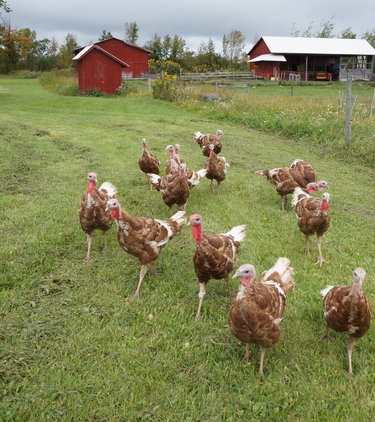Gordon fails to get judgment against Stefanie Rockwood for debts, defends against libel claim
KNOX — Following an article in The Enterprise last December about the legal battle between Alexander “Sandy” Gordon, a former Knox farmer and county legislator, and Joshua Rockwood — who owes more than $140,000 for cattle and farm equipment they purchased from him — Joshua Rockwood has alleged that Gordon conspired with The Enterprise to defame him and his wife, and that Gordon harassed the family as he sought repayment of the debt.
Also, in a separate case filed in Putnam County, a judge found that Gordon was entitled to money the Rockwoods would have made off of cattle originally purchased from Gordon.
In the initial case, the New York State Supreme Court for Albany County in May rejected Gordon’s request for a default judgment against the Rockwoods and a follow-up request to reargue the motion. Gordon is appealing the decision.
In an affidavit dated Feb. 24, 2023, and notarized in Cumberland County, North Carolina, Rockwood claims that Gordon and his attorney, Phil Vecchio, “claim that I disappeared which he made to this court and also in a published article/slander piece they helped write for the Altamont Enterprise is an interesting one since he and I had been in a Court Conference together around November 1, 2022, he has my cell phone and my email.”
Rockwood, in a response to Gordon’s complaints, acknowledges having made a promissory note worth $185,000 to Gordon, and says in his affidavit that “on at least 2 occasions I tried to negotiate a payment agreement with Mr. Gordon to take care of this debt,” having been turned down both times, and that Gordon “was unwilling to work with me on selling the assets unless I signed a confession of judgment which I was advised not to sign.”
Justice Richard Platkin ordered in November 2021 that Joshua Rockwood owed Gordon $140,597.15 of the original debt, including interest and other costs.
Gordon filed a lawsuit in August 2022 to collect that money, but the Rockwoods could not be served court papers because their location could not be determined. Post office records suggested that the Rockwoods were living in an RV park in Texas, but the process server could not locate them there, the documents said. Joshua Rockwood affirmed in his response to the lawsuit that the Texas address was their current one.
Since the Rockwoods could not be served the summons and complaint, Gordon was ordered by the New York State Supreme Court to serve them through a month’s worth of legal notices, which were published in The Enterprise and are how the paper became aware of the lawsuit. Gordon, who declined to comment due to open litigation, had also declined to comment for the December 2022 article; neither Gordon nor his lawyer contributed in any way to that story.
Rockwood’s counterclaims
In his affidavit, Rockwood alleges that Gordon “has been using illegal tactics Violating FDCPA, Fair Debt Collection Practices Act, Consumer Credit Fairness Act, as well as deformation [sic] of character, questionable surveillance, harassment, as well as disclosing my debt to third parties, and trying to have me arrested multiple times. Additionally telling others he intends to drown me.”
Specifically, Rockwood claims that Gordon would drive by the Rockwoods’ property “extremely slowly, stopping in front of our property and across the street,” and would have his nephew “fly over in the Medevac Helicopter Circling the herd on 2 separate occasions, taking pictures of our clients purchasing hay and potentially meat, and pictures of our vehicles etc,” in addition to calling the Albany County Sheriff multiple times to have Rockwood arrested.
Rockwood claims these alleged incidents made the family feel unsafe, and were why the Rockwoods left the property.
In a responding affidavit, Gordon denies all these claims, including that he had fed the story to The Enterprise, saying he had “no part” in the article.
Of the allegation regarding his nephew and the helicopter, Gordon said in the affidavit that his nephew, whose name is also Alexander Gordon, was “attached” at the time of the alleged incidents to the 109th Squadron of the Air National Guard based at Stratton Air Base in Scotia, and was an aircraft mechanic on a C-130 Hercules.
However, Gordon said, his nephew had “no connection with any Medevac Helicopter service whatsoever,” and “did not have access to helicopters or make any flights over the Rockwood farm.”
In a response to Gordon’s affidavit, Rockwood disagreed with Gordon’s assertion that he was not involved in the publication or reporting of the original Enterprise article, claiming that while Gordon “may not have directly brought this information to them,” the article contained information that “had to come from him or [his attorney] Mr. Vecchio.”
The Enterprise received no information from either Gordon or his attorney. All records referenced in that report were sourced from the Albany County Clerk’s online database, and The Enterprise was alerted to the suit by the court-ordered legal notices that Gordon had published in The Enterprise about it.
Rockwood also acknowledged in his responding affidavit that he “may be incorrect in who was piloting the medivac helicopter,” but that he purportedly has “video of this helicopter circling the farm.”
This week, Gordon told The Enterprise that the harassment claims were a “bizarre distraction” and a narrative with a “lack of facts.” Rockwood could not be reached at a number he had provided in court filings.
Gordon had run the roughly 100-acre farm in Knox since 1983, selling it in 2018 to the American Farmland Trust. As The Enterprise previously reported, the Rockwoods farmed the property through a lease managed by the trust. The property is now used by Justin and Damien Butts, according to county records.
According to Gordon’s lawsuit, the Rockwoods had also purchased around $185,000 worth of cattle and farm equipment from Gordon under a three-year repayment agreement.
In his affidavit, Rockwood says, of he and his wife, “Stefanie and I decided to close our separate farming operations, because we couldn’t become profitable on this property and had used up all of our savings in trying to,” adding that “COVID related challenges also greatly impacted our operations.”
Despite Gordon’s assistance early on, the Rockwoods failed to earn enough money to repay the money by the deadline, Gordon’s complaint says, and had requested a 90-day extension so that they could liquidate their assets; Gordon requested that the Rockwoods sign a confession of judgment in exchange for the extension, which would allow Gordon to more easily turn to the courts for help in the event of another default.
Rockwood further claims in his affidavit that Gordon is partly to blame for the farm’s failure, since he “didn’t disclose there were major water issues on the property, which made it extremely difficult to care for our family, and the farm and it increased animal impact,” referring to “death rates, conception rate, and live birth,” which Rockwood describes elsewhere in the affidavit as known variables of farming.
Rockwood also claims that Gordon’s “continued poor maintenance of the building property, and equipment led to continual and major challenges, and huge expense,” and criticizes Gordon for naming Stefanie Rockwood and the business under her name, West Wind Acres, in his lawsuit.
“I have helped Stefanie Rockwood manage her farm Stefanie Rockwood DBA [doing business as] West Wind Acres but have never been nor stated that I was an owner in any capacity,” Joshua Rockwood said in his affidavit.
The Rockwoods refused to sign the confession of judgment — with Joshua Rockwood explaining in his affidavit that it was based on advice from his former counsel — leading to the lawsuits from Gordon.
No default judgment
Despite the trouble he’s had reclaiming the money Rockwood owes him, Gordon was unable to convince the courts to issue a default judgment against Stefanie Rockwood, or Westwood Acres, an LLC under her name.
Justice Richard Platkin wrote that the evidence submitted by Gordon is insufficient to “establish the liability of Other Defendants,” noting that the $185,000 promissory note involved only Joshua Rockwood, with no reference to other parties.
The evidence from Gordon included a check written to Gordon intended as payment against the debt from Stefanie Rockwood, along with marketing and other business material distributed by the Rockwoods that suggested West Wind Acres was managed jointly by the couple.
Gordon then filed a motion to reargue, meaning essentially that he believed there was an error in the judge’s ruling and wanted another one.
This motion, too, was denied, with Platkin writing that he had “not stated a valid cause of action to recover upon a promissory note that had gone to judgment in a prior action.”
“Your moving papers,” the judge wrote, “do not identify any issue of law or fact that the court overlooked or misapprehended.”
Gordon is appealing that decision, according to court filings.
Inter alia
In the meantime, Gordon was successful in getting a Putnam County Court to name him the rightful owner of $12,000 worth of cattle that West Wind Acres — which the Rockwoods claim is managed solely by Stefanie Rockwood and not indebted to Gordon — had sold to Glynwood Center, a not-for-profit, regenerative farm in the town of Cold Spring in Putnam County.
According to the interpleader complaint filed by Glynwood in December 2021, the organization had purchased several cattle from West Wind, with plans to use them for farmer education as well as meat to be donated to local food-insecurity programs.
However, shortly after learning that the $12,000 check it had issued to West Wind was never deposited, Glynwood was asked by one of the Rockwoods to re-write the check to “an individual,” which Glynwood declined to do, the complaint says. It goes on to claim that Gordon’s attorney, Vecchio, then got in touch with Glynwood and “shockingly alleged” the cattle were “stolen property,” and that they would be reported as such to the Albany County Sheriff's Office.
In an affidavit dated April 18, 2022, Glynwood’s chief financial officer, Mark Daisley, said that he “instructed a Glynwood employee to cancel the check,” and that Glynwood’s “only interest [is] in having those funds be paid to the rightful recipient.”
In his answer to the complaint, Joshua Rockwood admitted that he was in debt to Gordon but that his wife and her LLC were not. Stefanie Rockwood meanwhile claimed that the original invoice sent to Glynwood did not list West Wind Acres as an LLC, and that “Glynwood agreed to purchase cattle from Stefanie Rockwood [doing business as] West Wind Acres.”
In August of 2023, after Gordon moved for summary judgment, Justice Gina Capone ordered that, because the Rockwoods failed “to respond to or oppose the motion,” the Rockwoods had “failed to raise a triable issue of act,” and awarded Gordon ownership of the funds.


